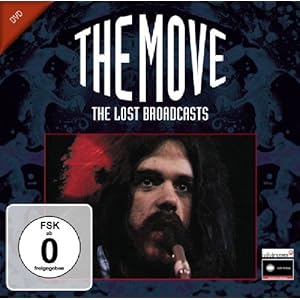
Huge in England for a time,
but utterly ignored in America, the Move are typically thought of in the states
— if they are thought of at all — as nothing more than an antecedent to Jeff
Lynne’s Electric Light Orchestra.
It’s a shame because, as these
rare, turn-of-the-1970s German broadcasts show, the Move had more than enough
personality, verve and sheer musical gamesmanship to stand on their own. Part
beat group, part blues band, part ornate pop group, part psychedelic rockers,
they may have been, if anything, too interesting for their own good.
The Lost
Broadcasts begins with a seminal moment for the Move, and not just because
1969′s “Blackberry Way” — a stamping piece of dark psychedelic pop co-produced
by Jimmy Miller of Rolling Stones fame — topped the UK charts. The Roy Wood
track, clearly inspired by the Beatles’ “Penny Lane,” signaled a seismic change
in the band, as co-founding guitarist/bassist Trevor Burton departed while
future ELO keyboardist Richard Tandy contributed a whirling harpsichord.
The Move were, in fact,
already a huge success in England, having appeared at the inaugural edition of
the Isle of Wight Festival in 1968. But, once again, they failed to chart in
America. “Blackberry Way” was, really, the beginning of the end for the Move,
which would in a few short years morph into the Electric Light Orchestra.
[SOMETHING ELSE!
REWIND: Watch as Jeff Lynne reunited recently with his former Electric
Light Orchestra bandmate Richard Tandy to perform their hit "Evil
Woman."]
The Lost
Broadcasts, newly issued via RadioBremen/Gonza MultiMedia, only later traces
back to some of the Move’s earlier successes. There’s the whooping “Fire
Brigade, a propulsive piece of jangle pop — save for that way-cool Duane
Eddy-inspired riff — that shot to No. 3 in the UK in March 1968 behind Wood’s
first lead vocal. But their innate sense of experimental verve was just as often
met by stony silence from the record-buying public that craved boring
consistency. Witness this set’s fiery, Jimi Hendrix-ish “Wild Tiger Woman,”
which sunk like a rock in the summer of 1968 — failing to make even the Top 50
in England.
By the time of the German
broadcast of Wood’s thunderously blues-soaked “Brontosaurus,” a No. 7 UK hit
from the Move’s 1970 album Looking On, you’ll find one Jeff Lynne playing
guitar. Carl Wayne, who had served basically as a co-frontman with Wood from the
start, had also departed. (“Curly,” a recorder-driven pop confection sequenced
later on Lost Broadcasts, was the last tune to feature Wayne and the
first with Rick Price on bass.)
Co-founding Move drummer Bev
Bevan and, in particular, Lynne quickly began to exert more influence on the
band. The pair composed three of the songs collected in Looking On, then
wrote or co-wrote six on Message from the Country, released in October of
1971.
At this point, you can hear
what’s coming next: “The Words of Aaron” finds Lynne at the piano, already
combining classical concepts with pop — and already sporting his signature
sunglasses. Later, back on guitar, Lynne leads a pair of renditions of this
raucous, rockabilly-inspired rave up called “Down on the Bay” for the television
audience.
But the Move’s second single
from Looking On, “When Alice Comes Back to the Farm,” also failed to
chart — despite some sizzling slide work courtesy of Wood, as heard here.
Elsewhere, there are two takes on the fuzz-grooved “Ella James,” from what would
ultimately become the Move’s swan song, an April 1972 EP that also featured
their early version of “Do Ya.” The latter, of course, would eventually become a
Top 20 hit in America — but for ELO in 1977.


No comments:
Post a Comment